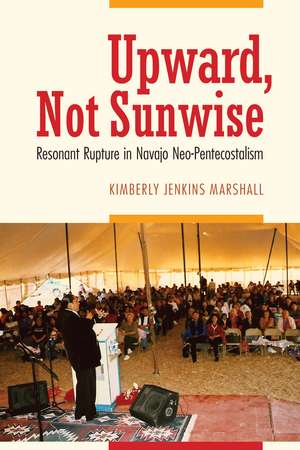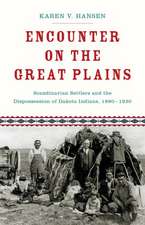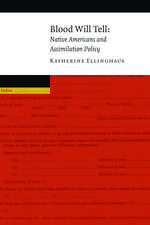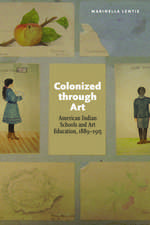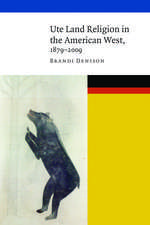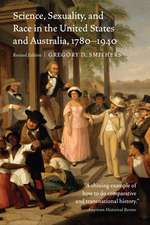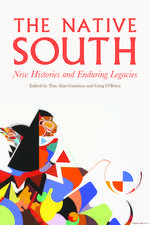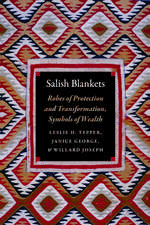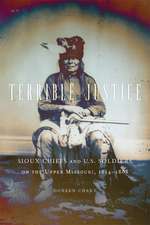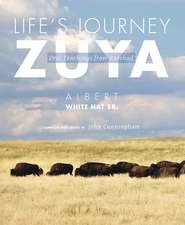Upward, Not Sunwise: Resonant Rupture in Navajo Neo-Pentecostalism
Autor Kimberly Jenkins Marshallen Limba Engleză Paperback – oct 2016
Upward, Not Sunwise explores an influential and growing neo-Pentecostal movement among Native Americans characterized by evangelical Christian theology, charismatic “spirit-filled” worship, and decentralized Native control. As in other global contexts, neo-Pentecostalism is spread by charismatic evangelists practicing faith healing at tent revivals.In North America, this movement has become especially popular among the Diné (Navajo), where the Oodlání (“Believers”) movement now numbers nearly sixty thousand members. Participants in this movement value their Navajo cultural identity yet maintain a profound religious conviction that the beliefs of their ancestors are tools of the devil.
Kimberly Jenkins Marshall has been researching the Oodlání movement since 2006 and presents the first book-length study of Navajo neo-Pentecostalism. Key to the popularity of this movement is what the author calls “resonant rupture,” or the way the apparent continuity of expressive forms holds appeal for Navajos, while believers simultaneously deny the continuity of these forms at the level of meaning. Although the music, dance, and poetic language at Oodlání tent revivals is identifiably Navajo, Oodlání carefully re-inscribe their country gospel music, dancing in the spirit, use of the Navajo language, and materials of faith healing as transformationally new and different. Marshall explores these and other nuances of Navajo neo-Pentecostal practices by examining how Oodlání perform their faith under the big white tents scattered across the Navajo Nation.
Kimberly Jenkins Marshall has been researching the Oodlání movement since 2006 and presents the first book-length study of Navajo neo-Pentecostalism. Key to the popularity of this movement is what the author calls “resonant rupture,” or the way the apparent continuity of expressive forms holds appeal for Navajos, while believers simultaneously deny the continuity of these forms at the level of meaning. Although the music, dance, and poetic language at Oodlání tent revivals is identifiably Navajo, Oodlání carefully re-inscribe their country gospel music, dancing in the spirit, use of the Navajo language, and materials of faith healing as transformationally new and different. Marshall explores these and other nuances of Navajo neo-Pentecostal practices by examining how Oodlání perform their faith under the big white tents scattered across the Navajo Nation.
| Toate formatele și edițiile | Preț | Express |
|---|---|---|
| Paperback (1) | 216.16 lei 6-8 săpt. | |
| Nebraska – oct 2016 | 216.16 lei 6-8 săpt. | |
| Hardback (1) | 493.57 lei 6-8 săpt. | |
| Nebraska – 30 sep 2016 | 493.57 lei 6-8 săpt. |
Preț: 216.16 lei
Nou
Puncte Express: 324
Preț estimativ în valută:
41.36€ • 45.07$ • 34.85£
41.36€ • 45.07$ • 34.85£
Carte tipărită la comandă
Livrare economică 23 aprilie-07 mai
Preluare comenzi: 021 569.72.76
Specificații
ISBN-13: 9780803288881
ISBN-10: 0803288883
Pagini: 270
Ilustrații: 18 images, 2 maps, 2 tables, index
Dimensiuni: 152 x 229 x 20 mm
Greutate: 0.4 kg
Editura: Nebraska
Colecția University of Nebraska Press
Locul publicării:United States
ISBN-10: 0803288883
Pagini: 270
Ilustrații: 18 images, 2 maps, 2 tables, index
Dimensiuni: 152 x 229 x 20 mm
Greutate: 0.4 kg
Editura: Nebraska
Colecția University of Nebraska Press
Locul publicării:United States
Notă biografică
Kimberly Jenkins Marshall is an assistant professor of anthropology at the University of Oklahoma.
Cuprins
List of Illustrations
Acknowledgments
Note on Transcriptions
Introduction: Resonant Rupture
1. The Oodlání Movement: Revivals, Research, and Relationships
2. Under the Tent: The Resonant Rupture of Ritual
3. Háálá Ayóo Diyin: The Resonant Rupture of Language
4. “God Never Listened to Country”: The Resonant Rupture of Music
5. Dancing in the Spirit: The Resonant Rupture of Nonhuman Actors
6. Embodying Healing: The Resonant Rupture of Faith Healing
Conclusion: Resonant Rupture, Sovereignty, and Global Pentecostalism
Notes
References
Index
Acknowledgments
Note on Transcriptions
Introduction: Resonant Rupture
1. The Oodlání Movement: Revivals, Research, and Relationships
2. Under the Tent: The Resonant Rupture of Ritual
3. Háálá Ayóo Diyin: The Resonant Rupture of Language
4. “God Never Listened to Country”: The Resonant Rupture of Music
5. Dancing in the Spirit: The Resonant Rupture of Nonhuman Actors
6. Embodying Healing: The Resonant Rupture of Faith Healing
Conclusion: Resonant Rupture, Sovereignty, and Global Pentecostalism
Notes
References
Index
Recenzii
"Marshall's book is based on several years of ethnographic research in Navajo communities in the southwestern United States. The only lengthy study of Navajo Pentecostalism that has been published to date, it deftly tackles the problem of rupture and continuity among Pentecostal converts, and shows that Navajo Pentecostals reject, reinterpret, remake, and conserve traditional beliefs and practices in intricate and sometimes conflicting ways. Marshall pursues a pioneering approach to indigenous Pentecostalism that will interest folklorists."—Ethan Sharp, Journal of Folklore Research
"The weighty contributions of Upward, Not Sunwise extend far beyond the tent-filled deserts of the Navajo Nation, deeply enriching the study of indigenous Christianity in a number of important ways."—Mark Clatterbuck, Pacific Historical Review
“Marshall’s ethnography is refreshingly engaging as it explores the complexities of contemporary neo-Pentecostalism among Navajos in the Navajo Nation. It adds a much-needed chapter about the diversity of religious experiences among Navajos and speaks to larger issues about global Christianity.”—Anthony K. Webster, associate professor of anthropology at the University of Texas, Austin, and author of Intimate Grammars: An Ethnography of Navajo Poetry
“Upward, Not Sunwise offers a fresh perspective on religious acculturation in an indigenous context. This book is unequaled for its contemporary analysis of Native people’s agency within Christian evangelical movements.”—David Shorter, professor in the Department of World Arts and Cultures/Dance at the University of California, Los Angeles, and author of We Will Dance Our Truth: Yaqui History in Yoeme Performances
